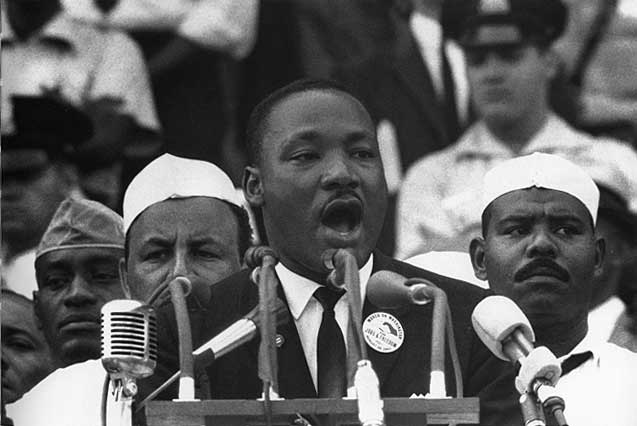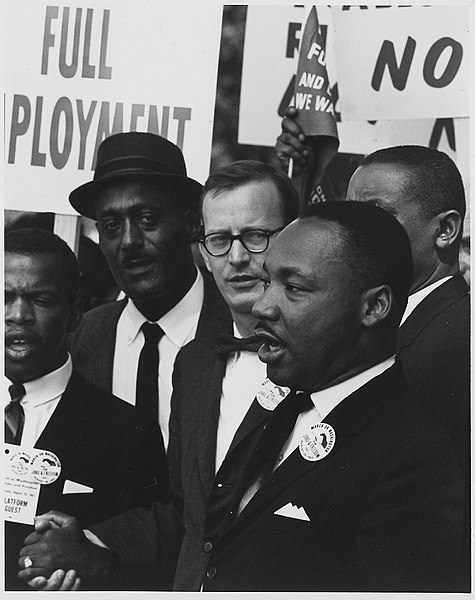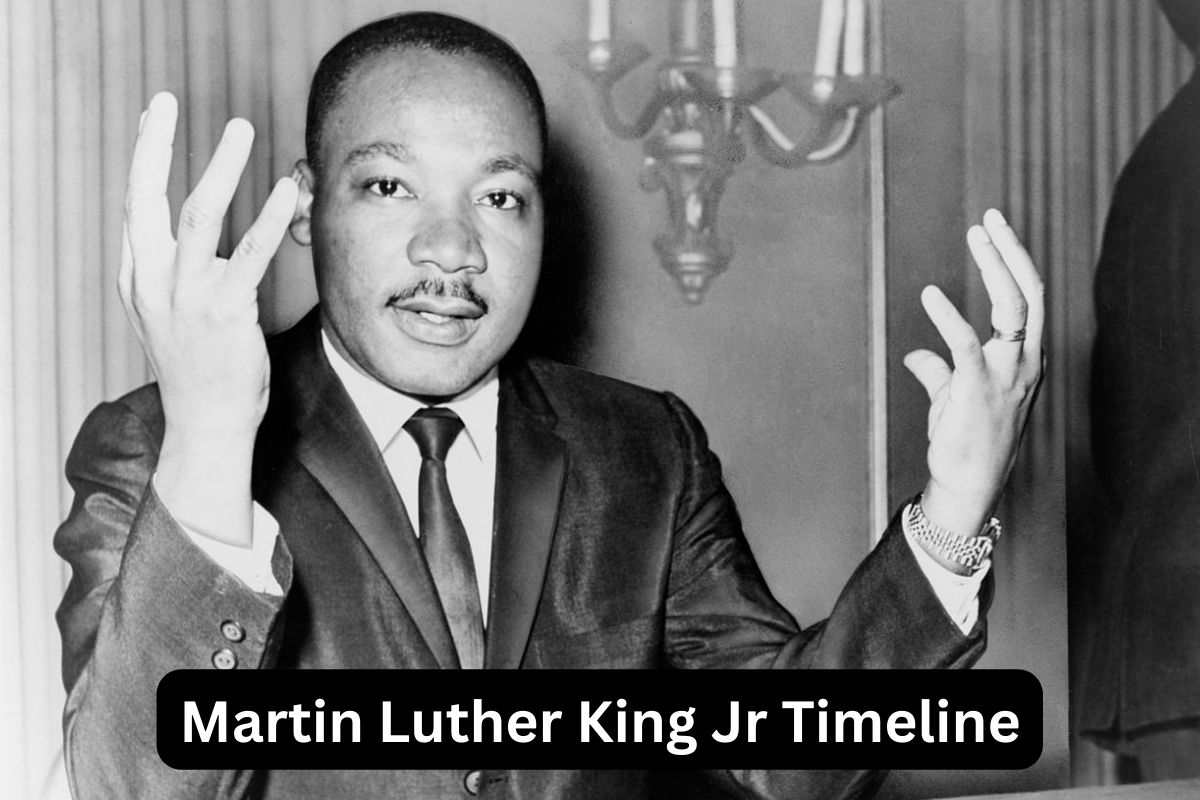Martin Luther King Jr. was a prominent leader in the American Civil Rights Movement, known for his tireless advocacy of racial equality, justice, and nonviolent resistance.
Born on January 15, 1929, in Atlanta, Georgia, King grew up witnessing racial segregation and discrimination, which profoundly influenced his lifelong commitment to fighting for civil rights.
He rose to prominence as a pastor at the Dexter Avenue Baptist Church in Montgomery, Alabama, where he played a pivotal role in organizing the Montgomery Bus Boycott in 1955.
King’s leadership and eloquence propelled him to the forefront of the movement, inspiring millions with his iconic speeches, including the legendary “I Have a Dream” speech delivered during the historic March on Washington in 1963.
He was awarded the Nobel Peace Prize in 1964 for his nonviolent resistance to racial prejudice. Tragically, King was assassinated on April 4, 1968, in Memphis, Tennessee, but his legacy as a champion of civil rights and equality continues to inspire and resonate worldwide.
Timeline of Martin Luther King Jr
January 15, 1929 – Martin Luther King Jr. is born in Atlanta, Georgia
Martin Luther King Jr. is born in Atlanta, Georgia. Martin Luther King Jr. was born to Reverend Martin Luther King Sr. and Alberta Williams King.
Also Read: Martin Luther King Jr Accomplishments
He was named after his father but later had his name changed to Martin Luther King Jr. He grew up in a middle-class African American family in Atlanta, Georgia. From an early age, he experienced racial segregation and discrimination, which would greatly shape his future activism.

1944 – King graduates from Booker T. Washington High School and enrolls at Morehouse College in Atlanta
King attended Booker T. Washington High School, a segregated school in Atlanta. He excelled academically and skipped both the ninth and twelfth grades, entering Morehouse College at the young age of 15.
Also Read: Martin Luther King Jr Facts
Morehouse College was a prestigious historically black college in Atlanta, known for its rigorous academic standards and its emphasis on cultivating leadership and social responsibility.
1951 – King graduates from Morehouse College with a Bachelor of Arts degree in sociology
King’s time at Morehouse College had a profound impact on his intellectual and social development. He was influenced by professors who advocated for social justice, including Benjamin E. Mays, the college president.
Mays, a renowned theologian and civil rights activist, played a crucial role in shaping King’s understanding of equality and nonviolent resistance. King graduated from Morehouse College with a Bachelor of Arts degree in sociology, setting the foundation for his future endeavors.
1953 – King marries Coretta Scott, and they would go on to have four children together
In 1953, Martin Luther King Jr. married Coretta Scott, a talented singer and activist he had met while studying in Boston. They were married in Marion, Alabama, and went on to have four children:
- Yolanda Denise
- Martin Luther King III
- Dexter Scott
- Bernice Albertine
Coretta Scott King would become a vital supporter of her husband’s civil rights work and a prominent activist in her own right. Their partnership was marked by a shared dedication to the fight for equality and justice.

1955 – King earns a Ph.D. in systematic theology from Boston University
King earns a Ph.D. in systematic theology from Boston University. He becomes a pastor at Dexter Avenue Baptist Church in Montgomery, Alabama.
In 1955, Martin Luther King Jr. successfully completed his doctoral studies and earned a Ph.D. in systematic theology from Boston University’s School of Theology.
His doctoral dissertation, titled “A Comparison of the Conceptions of God in the Thinking of Paul Tillich and Henry Nelson Wieman,” showcased King’s deep intellectual engagement with theological concepts and philosophies.
Following the completion of his studies, King accepted the role of pastor at the Dexter Avenue Baptist Church in Montgomery, Alabama. His position at Dexter Avenue marked the beginning of his influential pastoral and leadership career.
As the church’s leader, King not only delivered sermons but also became actively involved in the local community and the emerging civil rights movement.
December 1, 1955 – Rosa Parks refuses to give up her seat on a bus to a white person, leading to the Montgomery Bus Boycott, King becomes one of the leaders of the boycott
Rosa Parks refuses to give up her seat, leading to the Montgomery Bus Boycott. King becomes a leader of the boycott. On this day, Rosa Parks, an African American woman, refused to give up her seat on a Montgomery bus to a white passenger, which was required by segregation laws.
Her arrest sparked outrage in the African American community, and a boycott of the Montgomery bus system was organized.
King emerged as one of the prominent leaders of the boycott, delivering inspiring speeches and coordinating the efforts to challenge segregation. The boycott lasted for 381 days and ended with a Supreme Court ruling declaring segregation on public buses unconstitutional.
1957 – King helps establish the Southern Christian Leadership Conference (SCLC)
In 1957, King joined forces with other civil rights leaders, including Ralph Abernathy and Fred Shuttlesworth, to form the Southern Christian Leadership Conference (SCLC). The organization aimed to harness the power of churches and faith-based communities in the struggle for civil rights.
As the president of the SCLC, King emphasized nonviolent resistance as a means to achieve racial equality and justice. The SCLC would go on to play a significant role in organizing protests, marches, and demonstrations throughout the Civil Rights Movement.
August 28, 1963 – King delivers his famous “I Have a Dream” speech
King delivers his famous “I Have a Dream” speech during the March on Washington for Jobs and Freedom in Washington, D.C. One of the most iconic moments in King’s life occurred during the March on Washington for Jobs and Freedom.
Standing on the steps of the Lincoln Memorial on August 28, 1963, King delivered his powerful and inspiring “I Have a Dream” speech to a crowd of over 250,000 people.
In this landmark address, King articulated his vision of racial harmony, equality, and the end of racial discrimination in the United States. The speech remains a symbol of hope, resilience, and the ongoing fight for justice.
October 14, 1964 – King is awarded the Nobel Peace Prize for his nonviolent resistance to racial prejudice in America
In recognition of his tireless efforts in advancing civil rights through nonviolent means, Martin Luther King Jr. was awarded the Nobel Peace Prize in 1964. At the age of 35, he became the youngest recipient of this prestigious award.
The Nobel committee acknowledged King’s leadership and commitment to the principles of peace, justice, and equality. The prize further elevated King’s international prominence and provided a platform to amplify his message of nonviolence and social change.
During this period, Martin Luther King Jr.’s activism and eloquent speeches propelled him to the forefront of the Civil Rights Movement, making him a widely recognized figure both nationally and internationally.
His nonviolent approach and passionate advocacy for racial equality inspired millions and had a profound impact on the trajectory of the movement.
April 4, 1968 – King is assassinated in Memphis, Tennessee
Tragically, Martin Luther King Jr.’s life was cut short by an act of violence. On April 4, 1968, while in Memphis to support striking sanitation workers, King was assassinated on the balcony of the Lorraine Motel.
His assassination sparked grief and anger across the country, leading to widespread riots and protests in many cities. King’s death served as a catalyst for renewed commitment to the goals of the Civil Rights Movement and highlighted the ongoing struggle against racism and inequality in America.
January 15, 1986 – The Martin Luther King Jr. Day is established as a federal holiday in the United States
The Martin Luther King Jr. Day is established as a federal holiday in the United States, honoring King’s contributions to civil rights.
Martin Luther King Jr. Day is a federal holiday in the United States, observed on the third Monday of January each year. It commemorates the life and legacy of Martin Luther King Jr., recognizing his instrumental role in the American Civil Rights Movement and his tireless advocacy for racial equality and justice.
The holiday was signed into law by President Ronald Reagan on November 2, 1983, and it was first observed on January 20, 1986.
2011 – The Martin Luther King Jr. Memorial is dedicated in Washington, D.C.
The Martin Luther King Jr. Memorial is dedicated in Washington, D.C., becoming the first memorial on the National Mall dedicated to an African American.
On August 28, 2011, the Martin Luther King Jr. Memorial was officially dedicated on the National Mall in Washington, D.C. The memorial honors the life and legacy of Martin Luther King Jr., recognizing his significant contributions to the civil rights movement and his lasting impact on American society.
The memorial is situated adjacent to the Tidal Basin, between the Lincoln and Jefferson Memorials, symbolically aligning King’s presence among the prominent figures who played pivotal roles in shaping the United States.
It features a 30-foot-tall statue of Martin Luther King Jr., known as the “Stone of Hope,” which stands with arms folded, reflecting his strength, determination, and vision for a more just and equal society.
